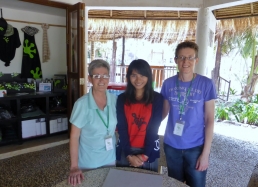February 2014 Newsletter
Happy new year! This time around we look at the benefits of advisory boards and how they can help take your business to the next level. Plus we have a quick look at the Fringe Benefits Tax implications of car parking and share a great story from one of our team members.
In this edition...
 There comes a time in the life of most businesses when fresh thinking, additional skills, new insights and strategic thinking are needed to propel it to the next level. It may be that a business is looking to expand and grow. Or perhaps it simply needs to adapt to a changing environment. Or maybe it is approaching a time where it needs to prepare for a transition to new owners. This is where an advisory board can be an invaluable component in a business strategy.
There comes a time in the life of most businesses when fresh thinking, additional skills, new insights and strategic thinking are needed to propel it to the next level. It may be that a business is looking to expand and grow. Or perhaps it simply needs to adapt to a changing environment. Or maybe it is approaching a time where it needs to prepare for a transition to new owners. This is where an advisory board can be an invaluable component in a business strategy.
It’s a simple reality of human existence that in any endeavour our perspective can be distorted by our proximity to it. This is particularly so in cases where the level of personal investment is high. In times like these we tend to consult others for wisdom and guidance. It’s a practice that is seen historically in most cultures – meeting with elders, confidantes and mentors for advice, and drawing upon the experience of others.
It’s no different in business. This is the role of an advisory board – a council of ‘elders’ who meet regularly to help you improve the way you do business (‘doing business well’ is of course very different from being ‘good at what you do’).
An advisory board is often not the same as your board of directors. In most small-medium businesses, a board of directors may be constituted by no more than two life partners, and even where it is something more, a small-medium business is still governed predominately by family members and/or people who work in the business. That is, they often have a vested interested in the business, or feel otherwise obligated to those who do. That can create a delicate balancing act between personal agendas and the best interests of the business.
An advisory board has more latitude and is made up of people who have expertise in commerce and industry. Just as importantly, they will usually also have distance from the specific operations of your business. They don’t exercise any authority over the business in the way that a director would, but rather exist to help the directors supplement their business acumen with skills and perspective that might otherwise be absent or neglected.
They may have the experience and insight necessary to help you establish better financial control or governance. They could assist you with improving your brand and the perception of your business in the marketplace, or have expertise in establishing new customer and supplier prospects and identifying product development opportunities. Ultimately, you may not necessarily know in advance what difference they will bring because that is the point of engaging an advisory board – to help you see what you might otherwise be missing.
Another benefit of an advisory board is that it keeps you accountable. Have you ever had great intentions, for example, to look into a new product or service but the day-to-day concerns of your business have prevented you from doing so? An advisory board will help you to set goals and stick to them, requiring you to report back on a regular basis.
So there seems to be a clear benefit in establishing an advisory board. But the act of opening up operations, finances and possibly family relationships to an outsider is a giant step for people who are used to keeping their own counsel, and who are used to success. The owners must find people they respect and trust, who in return are not so respectful that they will not tell the truth. This is why recruiting the right people is so important.
Business owners often find that they should look beyond their personal network of friends and advisors when forming an advisory board. In the community, there are people who work for larger enterprises or other businesses who are willing to give some time to assist others. Retired executive or those who have moved onto lifestyles that now permit them more time for other pursuits may be another good resource. If they come from a small-medium enterprise themselves, they sometimes feel the importance of this endeavour and feel called upon to help others doing the same thing. Recruiting an advisory board is a serious business that must be undertaken systematically. The best method of searching for candidates is to cast a wide net, seeking candidates from friends, advisors, colleagues and the community. Very often the best candidates are people that are not known by the owners, except maybe by reputation.
In an ideal world, we’d all like to retain strategic thinkers as members of our full time payroll, but for most businesses this would be prohibitively expensive. To get the best people for your advisory board, you will likely need to remunerate them in some way for their time, but it allows you to engage the skillsets your business needs at a fraction of the price of employing someone. You may even find a Government Grant available to help you with the cost.
We can all benefit from the wisdom and experience of others. Why should your business be any different?
We can help. Members of our team serve on a range of boards, and we can advise you on the entire process, from how to get started through to recruiting the right members and how to set the agenda. Please contact us to arrange a complimentary meeting.
.jpg) The end of the Fringe Benefits Tax year is nearly here. It all comes to an end once again on 31st March 2014. So it seems like a good time to us to highlight one aspect of FBT law that is often overlooked by employers - car parking.
The end of the Fringe Benefits Tax year is nearly here. It all comes to an end once again on 31st March 2014. So it seems like a good time to us to highlight one aspect of FBT law that is often overlooked by employers - car parking.
The inclusion of car parking as a taxable fringe benefit occurred a few years after FBT was introduced, and is a great example of the measure being applied to something that was rarely used for salary packaging purposes. More often than not, it was (and is) simply an incidental provision to enable employees to do their job. Perhaps that's why it's often missed by employers working through their FBT obligations. Nevertheless, if you provide parking for your employees, you must consider it or risk incurring a tax liability and penalties.
The good news is that if your business is not a public company, your assessable income is less than $10 million and most importantly, your employees park at your business premises, you are exempt from FBT for car parking. Hopefully that applies for most small-medium business enterprises. If you meet these criteria but your employees park in a commercial parking station and their parking is funded by your business, you may still have an FBT liability.
Where your employees do not park on site, or where they do but you operate a larger business, a car parking benefit will arise where
-
The employee's car is parked for more than 4 hours between 7am and 7pm on any given day;
-
A commercial parking station is located within a 1km radius of where the car is parked;
-
The lowest daily fee charged by a commercial parking station within that radius on 1st April each year exceeds a nominated threshold ($8.03 to be precise, for the 2014 FBT year);
-
The car is parked at or in the vicinity of the place of employment. What does 'in the vicinity mean? No one knows for sure, but a recent case ruled that a car that was parked around 2km from the employee's place of employment was not 'in the vicinity'. Make of that what you will; and
-
On the day the car is parked, it is used to travel between the employee's home and place of work.
Once you've determined that there is a benefit, there are then a number of different methods used to calculate the value of the benefit.
It's an extremely convoluted component of our tax system which provides a fantastic example of why business groups continue to call for tax reform. The administrative burden on business from this measure alone is immense. Nevertheless, for now and into the foreseeable future, this is the system we live with. If you provide your employees with parking and anything in this discussion has raised some red flags, please contact us for more information.
 One of our team members, Margaret, was recently in Cambodia and had the opportunity to work with The Green Gecko Project while she was there.
One of our team members, Margaret, was recently in Cambodia and had the opportunity to work with The Green Gecko Project while she was there.
The Green Gecko Project is a Siem Reap based organisation that helps provide security, education and other opportunities to children who previously lived and begged on the streets.
Margaret was travelling to Siem Reap for a holiday and came across The Green Gecko Project through Carry for Kids. Once she saw their online wish list she made some calls and before long she'd collected boxes of head lice treatment and deodorant direct from the supplier, toothpaste from her local dentist, along with a whole range of other items such as clothing, textbooks, old mobile phones and office stationery. Members of the Dewings team and some of our tenants also pitched in with contributions.
The next challenge of course was how to get it all over there. Thankfully, after a few more calls, Singapore Airlines agreed to allow her to take the whole lot as excess baggage without any additional charge.
The Cambodian Genocide of the 1970's resulted in the loss of up to a quarter of the population through execution or starvation. It devastated both the economy and culture of what had been a relatively prosperous South-East Asian country, and this period of history continues to cast a long shadow over Cambodia. Despite rapid economic growth in recent years, Cambodia remains one of the poorest nations on earth.
Margaret described her experience as one which really puts our lives into perspective. "We often think we are hard done by, have bad days and wish we had more of everything. When you have nothing, sometimes just a smile and a 'hello' makes things better for someone. To buy a small handmade gift for a couple of dollars will most likely feed a family that day and give them hope for the next. Despite their hardships and the horrors they have been through, the Cambodian people are extremely friendly, very happy and always smiling. The children at Green Gecko are incredibly grateful for all that they receive from 'Mumma Tania', the Australian girl who set this organisation up in 2005. This group of approximately 70 children (and now their siblings and families) will continue to be helped for many years to come."
We simply wanted to take this opportunity to congratulate Margaret on a job well done.
 Download PDF Newsletter
Download PDF Newsletter